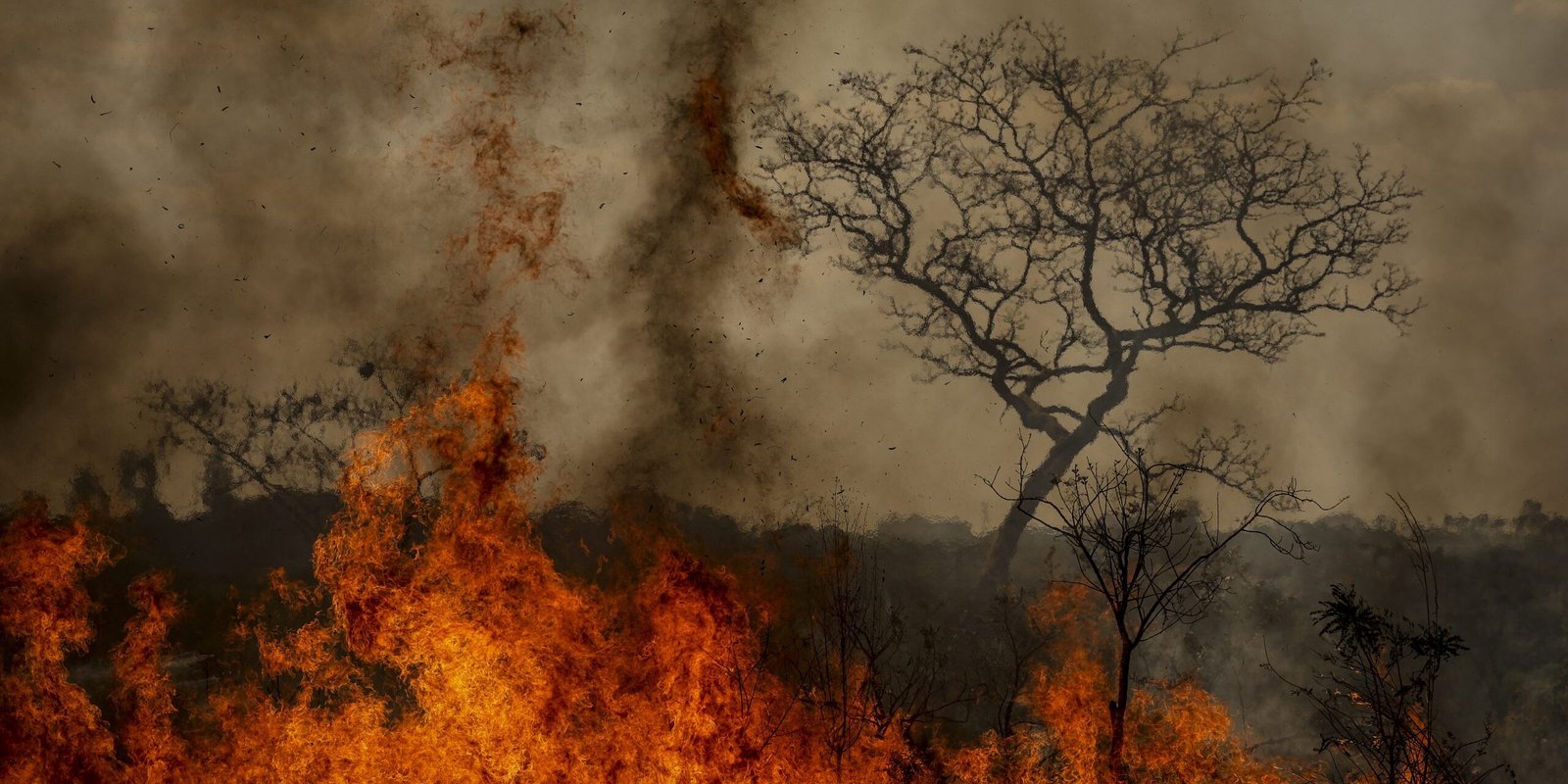Through this statement, the network Agro é Fogo wants to publicly denounce the systematic and orchestrated occurrence of criminal fires across the country, which is having a major impact on the population and the fauna and flora of Brazil’s biomes.
These fires have left huge scars, especially among traditional communities and indigenous peoples, exacerbated by the arrival of the dry season. Most communities don’t have the equipment or resources, and although their brigades they organize themselves have bravely fought against the criminal fires, the scars are severe. This has affected the genetic heritage of the territories and ways of life of the communities, such as their houses, sacred sites, community spaces, crops, gardens; directly impacting people’s food security, turning the land into a desert and threatening Brazil’s water basins.
Nowadays the communities have to deal with two problems: the fires and the drought, further aggravating their health with respiratory, cardiac and psychological problems. As indigenous leader Adriano Karipuna from the state of Rondônia states: “It’s not just a cold or flu, it’s that the climate is dry, so drink a lot of water, that’s what they tell us. So, there’s no solution, neither the criminal fires are contained, nor the problems that people are suffering because of the smoke solved, because inhaling this toxic smoke is terribly bad for any human being and the hospitals are becoming increasingly crowded with our People.”
In addition to the actions of the Ministry of the Environment, the Ministry of Health should allocate resources and expand health policies in collaboration with municipalities and the state government, taking measures to provide immediate care for the population, especially among the Indigenous Peoples and traditional communities, who are those less assisted by the public health system.
We also want to highlight that these fires are one of the main causes of climate change, which has gradually affected the country. And in recent years its impacts have grown exponentially. Biomes such as the Pantanal, the Amazon and the Cerrado – Brazilian savannah – have suffered losses in their water reservoirs, a reduction in the volume of water bodies and even the death of some rivers, in addition to the fact that, in recent years, the rainfall spread by the so-called rios voadores – flying rivers- has become irregular. This scenario of water stress and conflict are some of the consequences of climate change accelerated by agribusiness that has been advancing over the territories and becoming one of the main causes of the fires, orchestrating actions to set fire, cause deforestation and promote land grabbing, surpassing the number of fires in 2020.
This year, ten towns in the North and Centre-West account for 20.5% of the fires that have hit the country since the beginning of the year, according to the National Institute for Space Research (INPE): The ten municipalities most affected are: São Félix do Xingu (PA, 17.1%), Altamira (PA, 13.6%), Corumbá (MS, 11.7%), Novo Progresso (11.6%), Apuí (AM, 11.6%), Lábrea (AM, 9.3%), Itaituba (PA, 7.5%), Porto Velho (RO, 7%), Lagoa da Confusão (TO, 5.8%) and Colniza (MT, 5.6). Exactly the ‘arc of deforestation’, where under the so-called Growth Acceleration Programme (PAC) of the federal government, also infrastructure projects are planned, with the potential of more impacts on the environment and communities.
Although efforts to fundraise for the government’s environmental and climate agenda are being made, the goal is far from achieved. Data from the Institute for Socio-Economic Studies (INESC) warns about a constant lack of investment in socio-environmental and climate policies in Brazil, according to the publication ‘Balanço Semestral do Orçamento da União (January to June 2024)’ (https://inesc.org.br/balanco-semestral-do-orcamento-da-uniao/ ). It is key that governmental institutions execute all the funds earmarked for controlling forest fires. It is worth pointing out here that more than 70% of the budget of PrevFogo, the main federal structure in the country responsible for fighting unauthorized forest fires, has neither been used nor spent.
The images and stories reported are very impactful and, as researchers already pointed out. We are on the verge of a climate collapse, requiring redoubled efforts from public institutions at the federal, state and municipal levels. That’s why it’s necessary that the authorities take action, in particular ICMBio, IBAMA, the National Foundation for Indigenous Peoples (FUNAI), the Ministry of Indigenous Peoples (MPI) and the Environmental Police. It is key that the criminal fires that are set on purpose to cause deforestation, destruction of biodiversity and promote environmental terrorism, are urgently investigated and those responsible fined, reprimanded and imprisoned. And if repeating such actions, their lands should be expropriated and converted into either a permanent preservation area, an agrarian reform settlement or an area for use of traditional communities.
The communities also need emergency support, the provision of drinking water and food. Therefore, allocating and adding more public resources from the governmental budget is crucial. Emergency support actions include: programmes for storing and distributing seeds and seedlings of fruit and forest trees for reforesting degraded areas, and promoting agroforestry systems; restoring springs, water basins and protection of rivers. Develop at the national level programmes for cisterns to store water for the dry periods, which are taking place more often. Besides of speeding up and implementing the demarcation of indigenous and quilombola lands, as well as settlements for the landless people, actions that will concretely contribute to the conservation of territories and the fight against climate change.
The biomes are sacred territories of life. Once they are consumed by fire, they burn food, fauna, flora, soil, homes, sacred places and food sovereignty, they burn the hope of the people and burn the people’s way of life. We need to defend and recover the land, the water, food and protect life and fill peoples life with hope, the future is now!
Articulation Agro é Fogo
Website: https://en.agroefogo.org.br/
Instagram: https://www.instagram.com/agroefogo/
Contact: agroefogo@gmail.com




